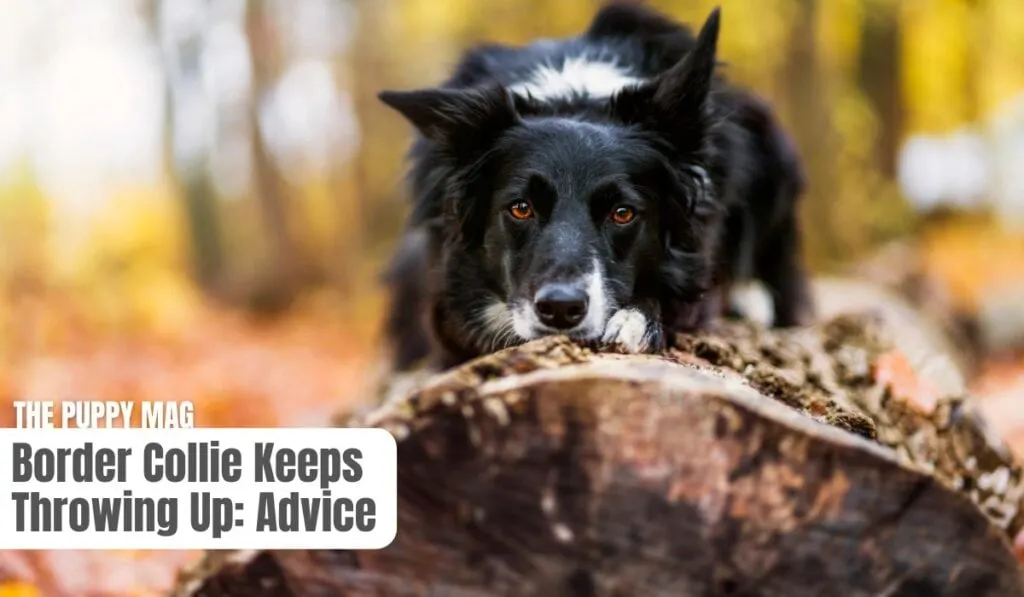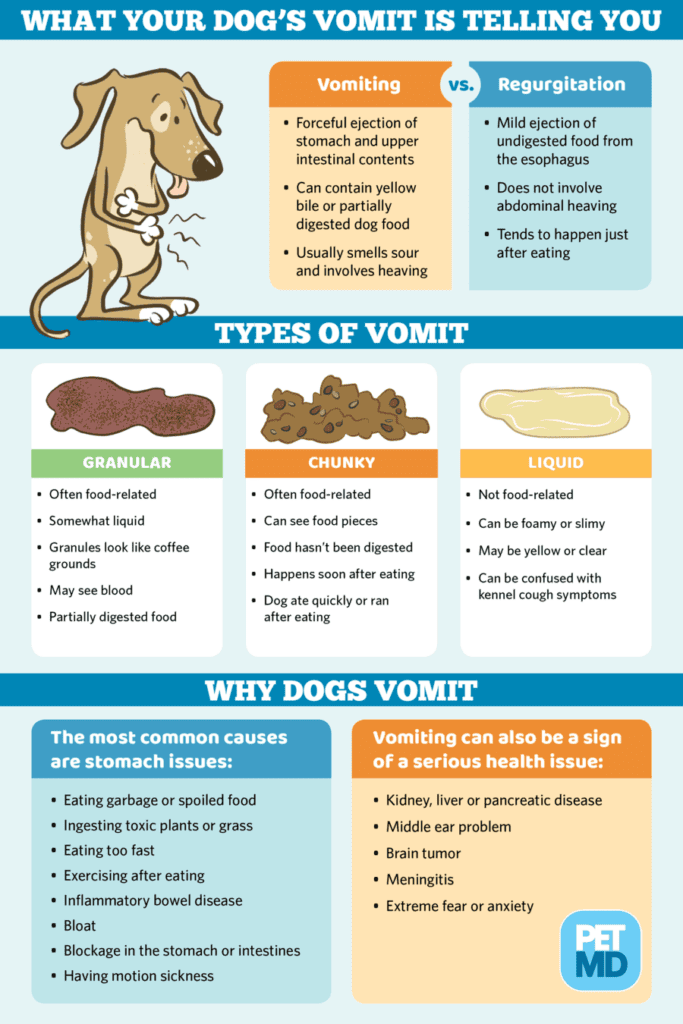As a loving pet parent, seeing your border collie throw up can be quite alarming. Don’t worry, we’re here to help!
This guide will help you understand why this might be happening and how you can help your furry friend feel better in no time at all.

Is Your Collie Throwing Up or Regurgitating?
First, let’s distinguish between vomiting and regurgitating. These are two completely different things. Vomiting usually indicates that’s something is wrong, where regurgitating can happen randomly for no reason at all.
Vomiting
Vomiting is an active process and generally involves a clear warning. Your collie might appear anxious, show excessive drooling, lip licking, retching, and then eventually eject stomach contents with force. Vomit usually includes partially digested food and is often mixed with yellow bile.
Regurgitating
On the other hand, regurgitation is a passive process where undigested food, that’s often tube-shaped from being in the esophagus, is expelled without much effort or warning. Regurgitated food doesn’t contain bile, which is a greenish liquid produced by the liver that helps with digestion.
Understanding whether your collie is vomiting or regurgitating is important, as they can be symptoms of different health issues.
If your collie is regurgitating, it’s usually a one off and doesn’t indicate that they’re sick or upset.
6 Reasons Why Your Border Collie Is Throwing Up
If your collie is throwing up, one of the six causes below will be the culprit. Knowing which one applies to your collie will involve thinking about recent events and any changes to your collie’s diet, routine, or day to day activities.
1. Eating Too Fast or Too Much
Dogs that eat too fast don’t chew their food thoroughly. This can lead to large pieces of food landing in the stomach, which are harder to digest, potentially causing your pet to vomit. In addition, when dogs eat quickly, they swallow air, leading to a condition known as gastric dilatation or “bloat.” Bloat can cause discomfort and vomiting. Similarly, eating too much in one sitting can overburden your collie’s digestive system and lead to vomiting.
2. Dietary Indiscretion
“Dietary indiscretion” is the fancy term for eating stuff that isn’t food or, at least, isn’t their food. Dogs are naturally curious and use their mouths to explore their environment. Sometimes, this leads to them eating something inappropriate like garbage, spoiled food, toxic plants, or non-digestible objects. Depending on what they ingest, it can upset their stomach or even cause a blockage, which might induce vomiting as the body tries to expel the harmful substance.
3. Gastrointestinal Obstruction
A gastrointestinal obstruction is a blockage that prevents food and liquid from passing through the gastrointestinal tract (which includes the esophagus, stomach, and intestines). This can be caused by your collie ingesting non-food items, such as toys, rocks, or pieces of clothing. Symptoms can range from intermittent vomiting to complete inability to pass stool, depending on where the blockage is. This is a medical emergency and needs immediate attention.
4. Pancreatitis
Pancreatitis is inflammation of the pancreas, an organ that aids in digestion and regulates blood sugar. It can occur as a single episode or as a chronic condition. Causes include a high-fat diet, trauma to the abdomen, certain medications, and certain metabolic disorders. If your dog has pancreatitis, they may vomit undigested food hours after eating. Other symptoms include a hunched back, loss of appetite, dehydration, and fever.
5. Infections and Diseases
Various infections and diseases, such as canine parvovirus, bacterial infections, liver disease, or kidney disease, can cause your collie to throw up. These conditions often come with other signs and symptoms such as lethargy, diarrhea, blood in the vomit or stool, fever, and sudden changes in behavior. Early detection and treatment are key to a successful recovery.
6. Motion Sickness
Just like some people, dogs can also get motion sick. This can occur in any form of transportation, including cars, boats, or airplanes. It’s thought to be due to the discordance between what the dog sees and what they feel, which can lead to nausea and vomiting. If your collie vomits during or immediately after a car ride, this could be the cause. It’s important to note that motion sickness is more common in puppies and young dogs as the ear structures used for balance aren’t fully developed.
How Often Is Your Collie Throwing Up
It’s crucial to note how often your collie is vomiting. A one-off incident may not be a cause for concern. Dogs, after all, are known to have the occasional digestive upset.
However, if your border collie is vomiting frequently or the vomiting is accompanied by other symptoms such as lethargy, diarrhea, or a loss of appetite, it’s time to take action.
Additionally, if your Collie is vomiting multiple times in the same day, or the vomiting continue for more than one day, it’s advised to call your local veterinarian.
What Kind of Vomit Is Your Collie Throwing Up
Examine the vomit, though it may not be a pleasant task. Is it food, yellowish bile, or clear liquid? Are there any foreign objects or blood in the vomit? Blood could look like red specks or could be dark and resemble coffee grounds. This information is important for a vet if you need to make a visit.
Check out this graphic below which explains what your collie’s vomit means.

What To Do Next
If your border collie has already been throwing up for days by the time you read this, then waste no more time and contact your veterinarian. At this point, it’s key to inform your vet.
If your collie has just thrown up then there a few things you can do first before you need to contact you vet.
Here’s what to do:
- Monitor your dog’s behavior: If your collie is behaving normally apart from the vomiting, keep a close eye on them for any additional symptoms. This includes lethargy, diarrhea, or a loss of appetite. Contact a vet if you see these.
- Remove access to food for 3-4 hours at least: This will give your dog’s stomach time to rest.
- Gradually reintroduce bland food: The next thing your collie eats should be bland food. Start with a bland diet like boiled chicken and rice. If your dog tolerates this well, gradually reintroduce their regular food over a few days.
- Encourage hydration: Make sure your dog has access to plenty of clean water. Dehydration can be a risk if your dog is vomiting frequently. If your collie can’t stomach water or refuses it, then call the vet.
- Remove possible triggers: If you think your collie might have eaten something they shouldn’t have or if they’ve been eating too quickly, try to mitigate these issues.
Remember, that there’s no wrong moment to call your vet, other than too late. With that being said, if you are worrying about your collie or you suspect something bad is happening, then call your vet right away to get their professional advice.
When To See a Vet
It’s time to call the vet if:
- Your collie is vomiting repeatedly or can’t hold down water.
- They appear lethargic or more tired than usual.
- You notice blood in their vomit.
- You suspect they’ve eaten something harmful.
- Their stomach is bloated or hard to the touch.
Remember, you know your border collie best. If you’re concerned about their health, it’s always best to reach out to a veterinarian. Vomiting can be a symptom of many different conditions, some more serious than others. It’s always better to be safe than sorry when it comes to your pet’s health.
Last Thoughts
There you have it! a comprehensive guide on why your Border Collie might be throwing up and what steps you can take to help them.
Remember, it’s perfectly normal for your dog to have the occasional upset stomach, but consistent vomiting is a sign that something isn’t right.
Whether it’s a simple issue like eating too quickly, dietary indiscretion, or something more serious like a gastrointestinal obstruction or illness, it’s essential to keep an eye on your collie’s behavior and consult with your veterinarian if you have any concerns.
We know it’s tough to see your furry friend in distress, but by being observant, acting promptly, and working closely with your vet, you can ensure that your Border Collie receives the best care possible. After all, our main goal is to keep those tails wagging and our four-legged friends as happy and healthy as possible!
